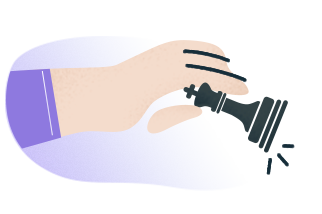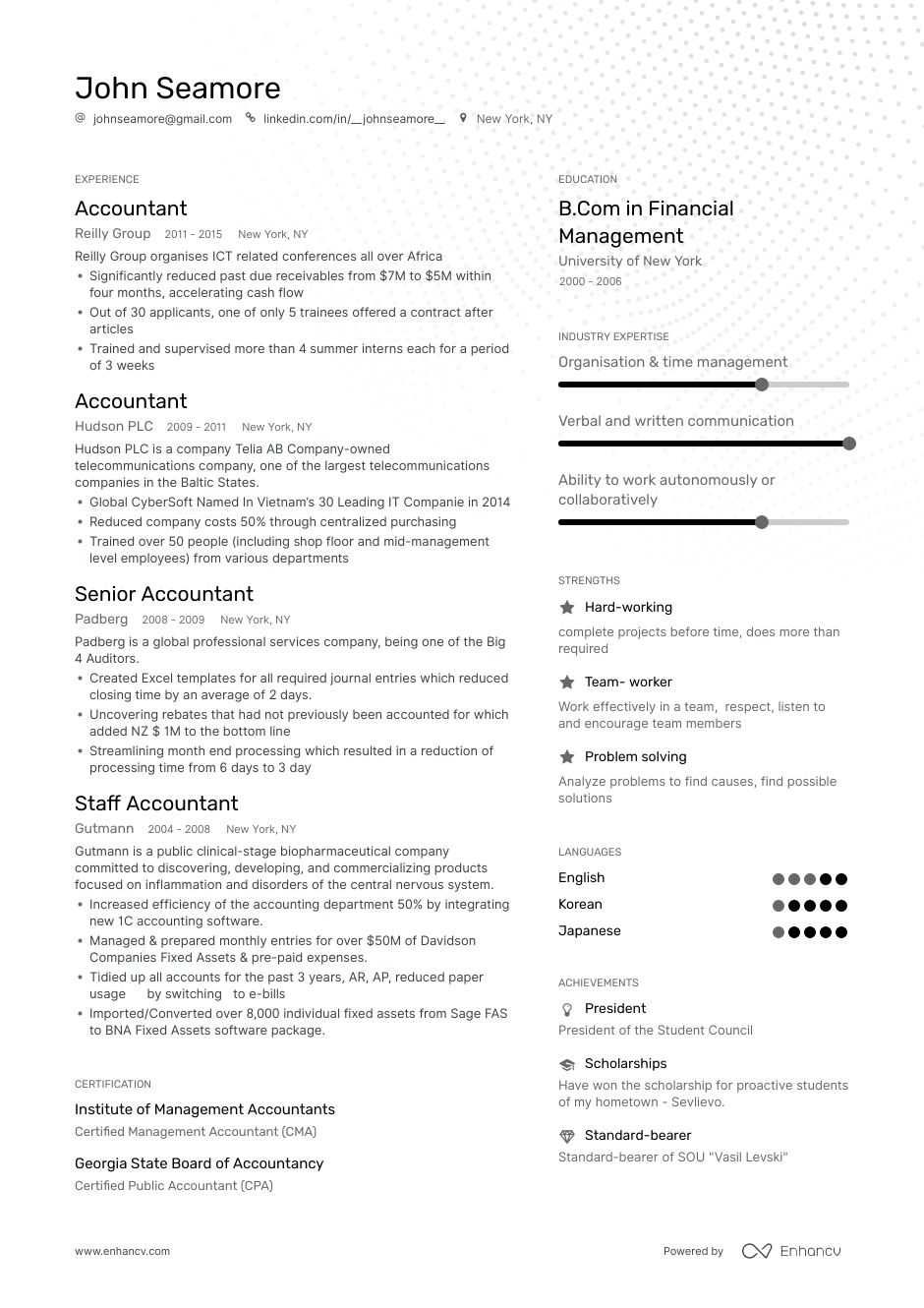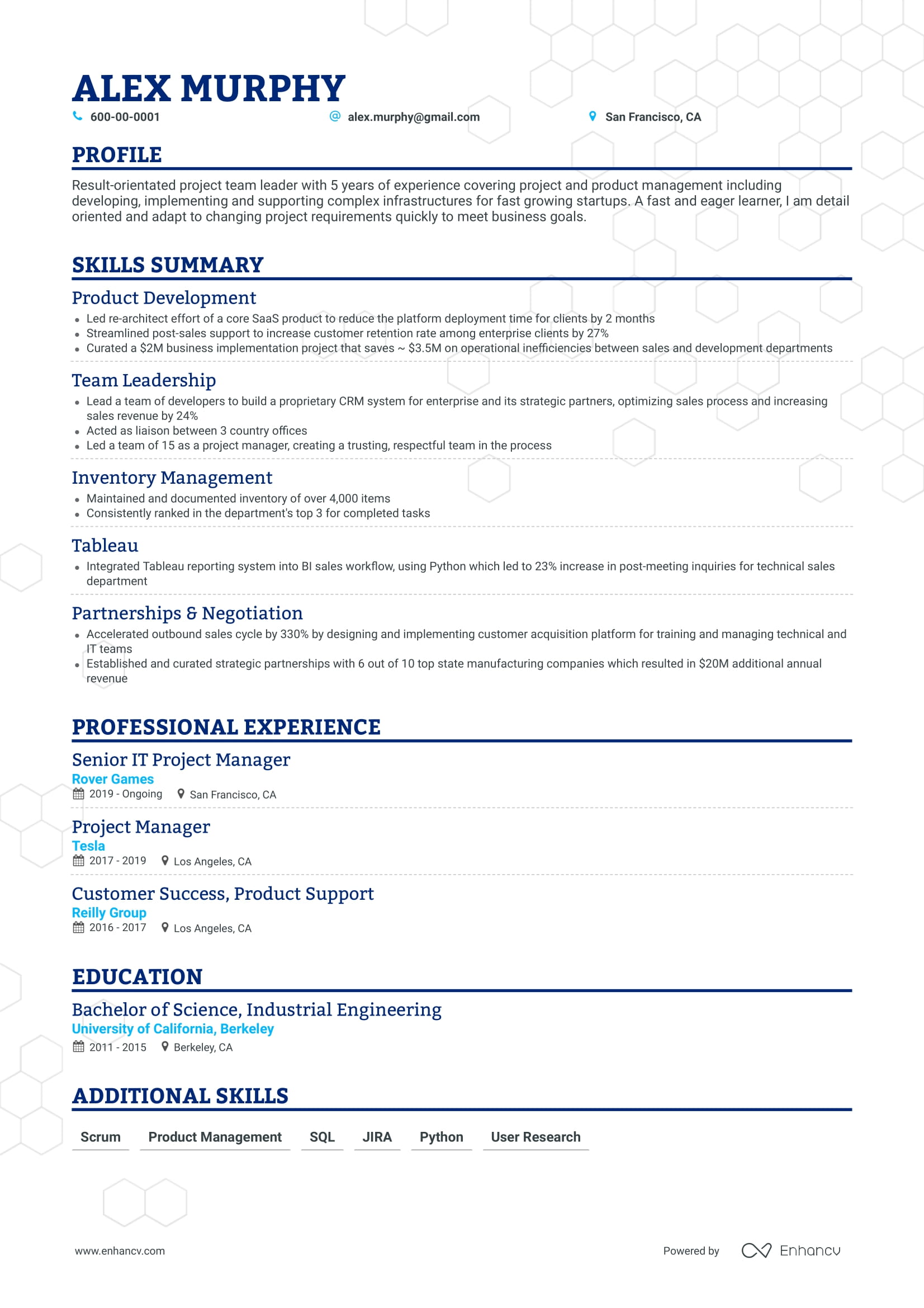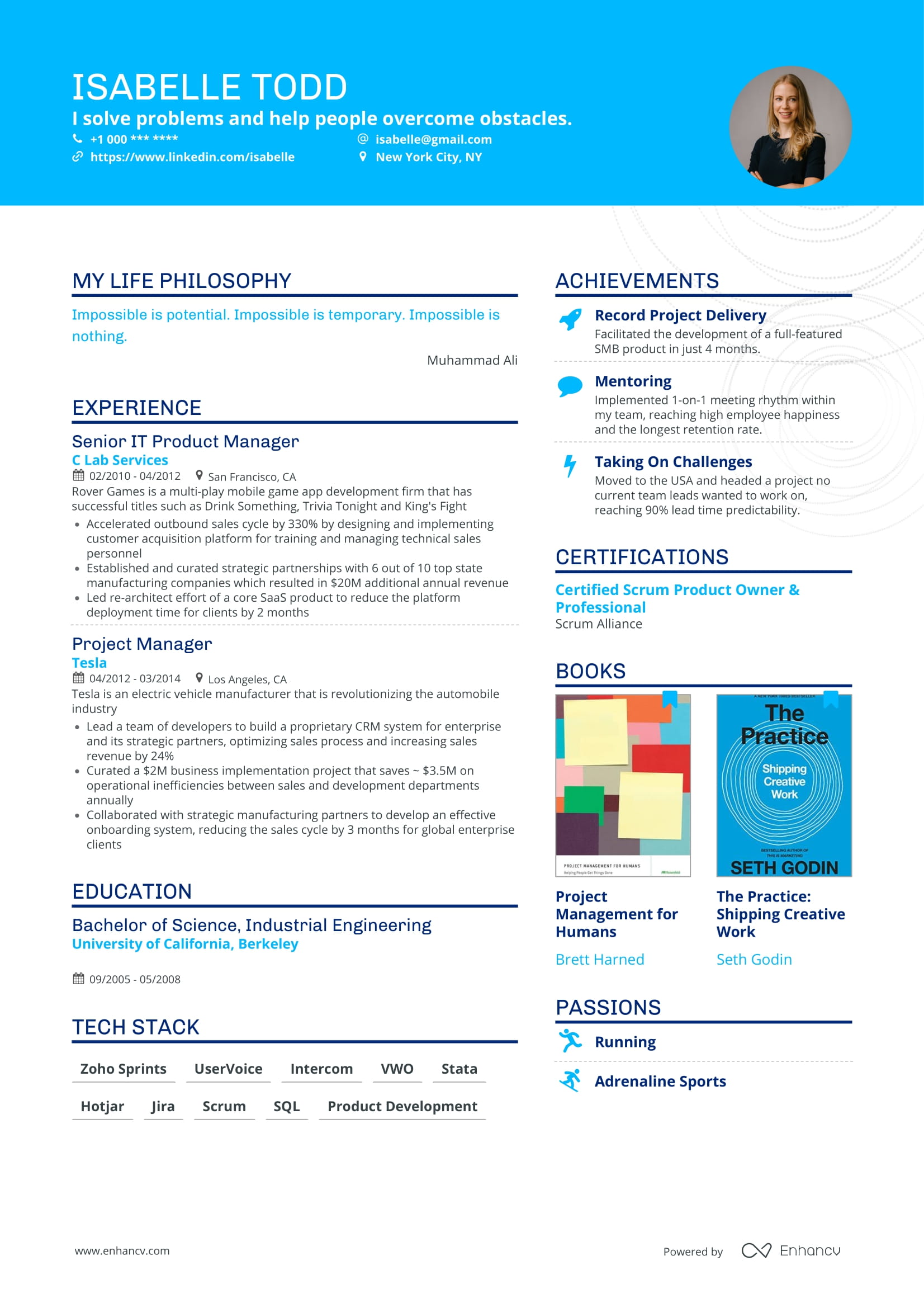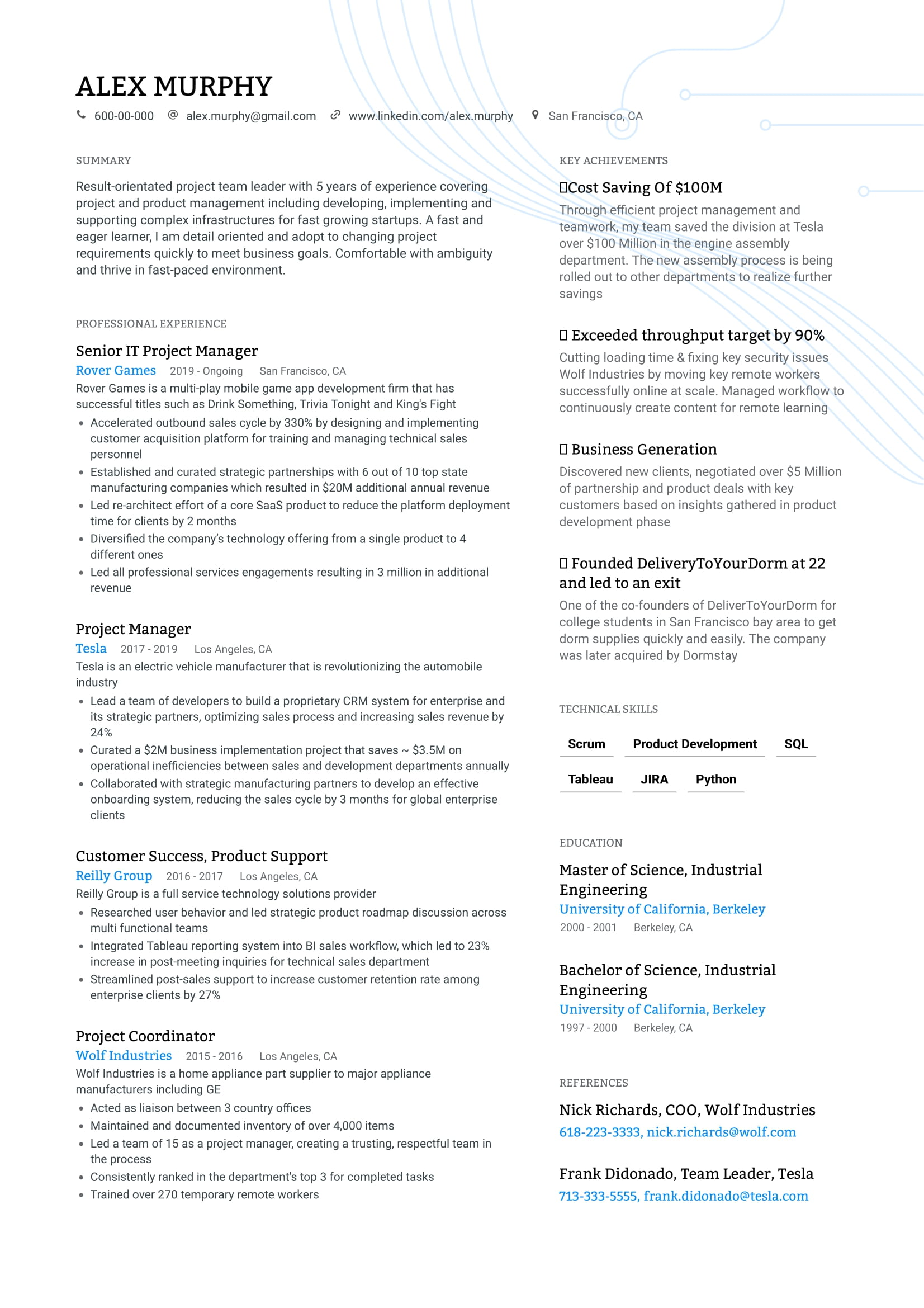Example Accounting Resume - Browse more resume templates and build a stand-out resume
You know spreadsheets.
You know accounts receivable, accounts payable, payroll and more.
Yup, you work in accounting.
But you’re looking to switch positions and are worried your resume may not survive an audit?
Don’t worry, what you’re about to read has all the checks and balances you need to create a professional accounting resume quickly and easily.
Here’s an accounting resume sample & how to use our resume builder
An accountant resume has to go beyond the basic certifications employers expect. You need to demonstrate that you can have an impact in your roles and are a good culture fit. This means carefully studying the job and the company offering it before crafting a resume that fits it perfectly.
In this accounting resume guide you’ll learn the following:
✔ Choose the right accounting resume template for your experience level
✔ How to include accounting skills on a resume that reflect the job description
✔ Creating the most powerful accounting resume summary or objective you can
✔ Even an entry level accounting resume can be effective by showing relevant skills
✔ How to include the right certifications on an accounting resume
Try one of our FREE accounting resume templates:
- Financial analyst resumes
A great financial analyst needs to balance the ability to delve deep into data for analysis and then to explain it to decision makers. That’s why the main challenge for a financial analyst resume is balancing these two distinct skill sets. But before you start, you need to understand what the job you’re applying for wants from you.
Begin by closely analyzing the job description and the company. What skills and qualities are they looking for? What does the company culture look like? Your resume should match you as closely as possible to these needs. Consider the person who will read your resume and what you can do to make it easy for them to say “yes” to you.
If you have previous financial analysis experience (whether formal or not), try and quantify it. Being specific about your accomplishments is going to have a far greater impact than simply listing your responsibilities.
- Bookkeeper resumes
Most people looking to hire a bookkeeper have fairly straightforward expectations. They expect you too accurately and efficiently balance the books and conduct other accounting work. The question is, how do you clearly demonstrate you have these skills on a resume?
Most bookkeeper resume examples rely on simply listing responsibilities, so you can distinguish yourself by focusing on quantifiable accomplishments. Mention how many accounts you balanced, how much money you saved a client, or a major accomplishment you had. Consider who will be reading your resume and what kinds of information will be meaningful to them.
- Auditor resumes
It’s expected that any auditor is going to be capable of analyzing, monitoring, writing reports, etc. To stand out on your auditor resume, you need to show what specific results you’re capable of achieving for a client.
Explaining that you analyzed an account and solved a resulting issue doesn’t tell the person reading your resume very much. Explaining precisely how much money you saved a client, or how quickly you were able to put together a report gives them a better idea of what kind of results you can bring.
Also consider what else might be important for the position. If showing that you have good customer service skills, work well under pressure, or are creative might help, including accomplishments that demonstrate you have these qualities can work wonders.
- Banking resumes
An effective banking resume needs to show you have the exact skills, experience, and expertise required for the position. To do that demands laserlike focus.
Begin with the job description, what exactly are they looking for? Once you’ve made a list of everything they want, try to check as many things off by including them in your resume. When including skills and experience, be as specific as possible.
Lastly, don’t be afraid to include a bit of personality. Showing that you’re a positive person, easy to work with, etc. helps make you an easy hire (even in banking). You can do this by discussing what you’re most proud of, your passions, or how you spend your time.
Looking for related resumes?
How to create the best accounting resume outline
Just like balancing a company’s books your accounting resume needs the right balance of education, skills and experience.
Here’s the most common accounting resume outline
- Objective
- Accounting Experience
- Education
- Soft Skills
- Technical skills
- Interests
- References
Of course every resume might vary based on the person or the job. It’s important to determine where your strengths are and what information you want to get across to the reader first.
For example while your interests might seem important to you, a hiring manager for an accounting job is going to want to see your accounting experience first.
Choose the accounting resume layout that’s right for you and the job your applying for
Before anyone even reads your resume they’re going to see the resume layout. It can demonstrate professionalism, originality and organization at just a glance.
So choose a template that sends the right message for you.
- Basic layout - If you’re looking to get hired as an entry level accountant in an accounting department and you don’t have a lot of accounting experience this format is incredibly easy to read and doesn’t look light.
- Professional layout - use this template if you’re applying for a big corporation like E&Y, or one of the other big accounting firms. Accounting is known as a conservative industry that is guided by rules and order, so especially for these companies it’s good to use a professional accounting resume layout.
- Simple layout - applying to a company that you don’t know much and you don’t want to risk getting rejected? Than this layout can work best for you.
- Creative layout - Are you looking to show you’re different? Maybe you’re applying for an accounting position in a tech startup. Then you want a resume with more colourful with more personal sections.
Here’s what to consider when choosing the perfect accounting resume layout:
- Be sure it presents all of your accounting qualifications clearly
- It should place your most important accounting information at the top
- It should be easy to read and catch your eye
- It should work with ATS (Applicant Tracking Systems)
- Be sure to send it as a PDF
If you can match your accounting resume layout to job you’re going after you will be giving yourself an advantage that many other accountants may not have.
Your resume was noticeable, clear and easy to read.
This is the perfect formula to get your resume on the top of the pile.
Make sure your ringer is on, cause you’re going to get called for an interview!
Making the best resume header for an accounting resume
Each hiring manager, whether a CFO, controller or accounting manager, has a desk full of resumes and no time to review them in detail.
So if you’re going to get their attention you need to stand out fast and your resume header is a great way to do that.
An accounting resume header should have:
- Your name - include next to it if you have the following certificates - CFA, CPA, etc. This way the HRs can see in the first seconds that you’re qualified enough. Even if you’re in the process of taking them, consider adding “CFA candidate” for example, after your name.
- Your accounting resume title - you’ve worked in big four before or you’ve graduated top financial university? Add these to your resume title
- Your linkedin profile - well this is the social network for most of the financial people out there. Adding facebook or twitter will make other financial people wonder when looking at your resume.
It’s always a good idea to put yourself in the shoes of the person reading your resume and ask yourself “would I want to hire this person?”
How to write an accounting resume objective or summary
You created an attention grabbing resume header.
Now you’ve got them wanting to read a bit more about who you are.
This is where a powerful accounting resume objective comes into play.
This is the place where they get the first impression of who you are and what you’re about, so you better get it right.
For example:
The problem? It doesn’t tell the reader anything very useful. It’s also not specific to the position, it reads as generic.
Or, for an entry level accountant
With just a few extra words you can turn a boring and mundane resume objective into a professional and powerful accounting resume summary that will get your resume put on the “yes pile”!
An accounting resume objective should
- Be specific
- Express your short and long-term career goals
- Say something about who you are and what you’re good at
- Be addressed to the specific job you’re applying for
How can I present my accounting experience on my resume?
When you start crafting your experience section, you need to make sure you show the big picture. This means writing more than just details on accounting projects or transactions. Also, in your bullet points, try to incorporate powerful words such as managed, analyzed, evaluated, and directed. Just be sure to avoidbuzzwords recruiters are tired of.
Vague statements and lists of responsibilities won’t impress hiring managers in accounting. When crafting your bullets in the experience section, make sure you use real results your work had for the company you worked for.
Use percentages and exact numbers to demonstrate your effectiveness to a potential employer.
While there are fairly similar requirements for positions like “Senior accountant,” the companies offering this position are always different. They have different cultures, ways of working, and can obviously be in totally different industries.
A resume you’d use for an accounting position in a large corporation should look and feel much different than a resume you’d use for a tech startup. Job search is a difficult task and to higher your chances, make sure you tailor your resume for every position you’re applying for.
A guide to creating an entry level accounting resume experience section
So you’ve recently graduated from school and don’t have work experience or what most would consider to be background in the accounting field. How are you going to get an entry level accounting job?
Well you need to realize that hiring managers look for more than just hours at a desk honing accounting skills.
Believe it or not, there are lots of ways to show your value so you can be considered for that position in their accounting department.
Things like showing you can work well under pressure, be effective on a team, or analyze metrics are sometimes a key point of difference between you and other applicants. This experience could come from an internship, a side project, an organization you volunteer for, etc.
Here’s how you create an accounting resume with no experience:
- Start by identifying the kinds of skills and experiences you think will be relevant for the accounting job you’re applying for. Things like “the ideal fit is someone who works well in a small team.”
- Now, look back at your previous experiences to see what you may have done which could demonstrate that. In this example, maybe you interned at a startup where the accounting team was small and had to handle a wide variety of financial taks.
- Once you’ve got the right experience, emphasize it using the same language the job description did.
With these techniques, even if you’ve never had accounting or finance job, you can still show you’re qualified for your first position.
Of course, if you’re creating an entry level accounting resume, your education section is of particular importance.
How to present education on an accounting resume
The amount of detail your education section should show is usually related to how many years of experience you have.
For example, if you’re an accountant who has had 2 or 3 different accounting positions over a 10 year period you’re not likely going to put much more than the school, degree and year you graduated. The hiring manager is likely just looking to make sure you have a degree and then move on to your experience section.
Now, on the other hand, let’s say you’re a younger accounting professional who has little or no experience. This is when you want to provide more details on your accounting education in order to make an impression.
Here’s what you can add to your education section:
- Relevant courses (here you can mention projects, skills acquired, lessons learned, etc.)
- Awards
- Your GPA (if you think it’s relevant)
- All of the regular information mentioned above
Here you can find a more senior accounting education section example:
Here is an entry level accounting education section example:
Including skills on your accounting resume
It’s important to understand the difference between accounting soft skills and accounting technical skills.
Each has a different approach and you need to know how to format and how to put accounting skills on a resume
Let’s break down the difference and how to do each one the best way.
How to include technical skills on an accounting resume
This works best for skills that are binary and straightforward. In this case, it’s used to list software.
You’re either familiar with the software or you’re not. There isn’t really a need to elaborate beyond that.
This kind of a skills section is important because many ATS (Applicant Tracking Systems) will screen your resume for certain keywords before a human ever sees it). A simple list of relevant technical skills required in the job description does the job perfectly.
The top accounting resume technical skills
- FreshBooks
- Microsoft Excel
- Sage 50cloud
- NetSuite ERP
- QuickBooks Enterprise
- Zoho Books
- Gusto
- FreeAgent
- Sage Business Cloud Accounting
- Tipalti
- Zoho Expense
- Zoho Invoice
- Online Invoices
- Sage Intacct
- Xero
- ADP Workforce Now
How to include soft skills on accounting resume
Soft skills on an accountant resume are different. When in a list, they don’t say anything special. They need more detail in order to make a difference.
It’s always going to be more effective to show that you have a soft skills by giving an example rather than simply stating that you have it.
That said, if the job description asks for a specific soft skill like “leadership” be sure to use that word when you describe it in your resume. This is both for the ATS systems mentioned above and that using the word makes it easier for the reader to notice times when you demonstrated these skills and think “great, I can check that off the list.”
Here, you can see that someone scanning your resume can quickly see which soft skills you possess and that you’re serious about backing them up. Right away, this is going to distinguish you from most of the other accountant resumes they’ve seen.
The top accounting resume soft skills
- Problem-solving
- Interpersonal communication
- Presentation skills
- Working well in teams
- Leadership
- Management
- Time management
- Decision making
- Strong written and oral communication
- Organization and attention to detail
- Analytical and problem solving skills
- Time management
- Systems analysis
- Mathematical and deductive reasoning
- Critical thinking
- Active learning
How to find the right technical and soft skills to include on your accounting resume
The job posting that you’re applying to is packed full of the exact skills your accounting resume should include.
Let’s take some text from an Accounting Manager job offered in California:
- Maintain accurate fixed asset records in accordance with capitalization policy.
- Complete month-end close process including journal entries and account reconciliation.
- Maintain a thorough understanding of the financial reporting and general ledger structure to maximize the facilitation of both current and future reporting requirements.
- Responsible for accurately preparing certain account reconciliations and reviewing them with the Controller.
- Assist Controller and department with the design and implementation of policies and procedures, special projects and reports, including the development of Financial Statements and related analysis as needed.
- Develop and maintain the system of internal accounting controls and financial reporting.
- Identify project related risks and develop mitigation plans.
- Maintain state registrations, business and tax licenses.
- Analyze company financial performance and provide strategy to lower costs and improve profit.
- Protects organization's value by keeping information confidential.
Highlighted are skills that should be highlighted and demonstrated on your resume. Here’s how to break them down.
Month-end close process, account reconciliation, financial reporting, development of Financial Statements (these can be listed as technical skills)
Analyze, provide strategy, mitigation plans, confidential (These should be backed up with examples)
This is only a portion of the requirements, but it’s already clear that you’ll have a lot of soft skills to demonstrate. When this happens, you can go beyond simply listing them in their own section and try to ensure they are mentioned and backed up in your experience, education, or other resume sections.
Top 5 skills on accounting resumes vs job offers
We conducted our own independent research on Indeed.com, analyzing over 100,000 resumes and job listings to determine which skills were most in demand. Based on this research, these are the top 5 most useful skills for an accounting resume to include on their resume and how often they appeared on resume and job descriptions.
If there’s a big gap, that means having that skill will really make you stand out from the competition.
Adding certifications your accounting resume
This can be done similar to your technical skills section, or you can add CFA or CPA before your name at the top if that’s your only relevant certification. Just be sure to mention any certifications the job offer specifically asks for or mentions.
InTop certifications to include on an accounting resume
- Certified Public Accountant (CPA)
- Certified Financial Analyst (CFA)
- Certified Management Accountant (CMA)
- Enrolled Agent (EA)
- Certified Internal Auditor (CIA)
- Certified Information Systems Auditor (CISA)
- Chartered Alternative Investment Analyst (CAIA)
Key takeaways: what makes a great accounting resume?
- Choose a resume layout that sends the message you want and fits your experience level.
- Create a resume header that shows your accounting certifications and makes sure you’re easy to contact.
- Make sure your resume objective or summary is very specific about your accountant experience, accomplishments, and future goals.
- Your accounting experience has detailed metrics and specific examples showing the impact you’ve had in your role.
- Any soft skills you list are backed up with examples.
- You list all of the technical skills and finance certifications you have which match the job description.
- Your resume has a bit of personality designed to show you have the right soft skills and will be an excellent culture fit.
